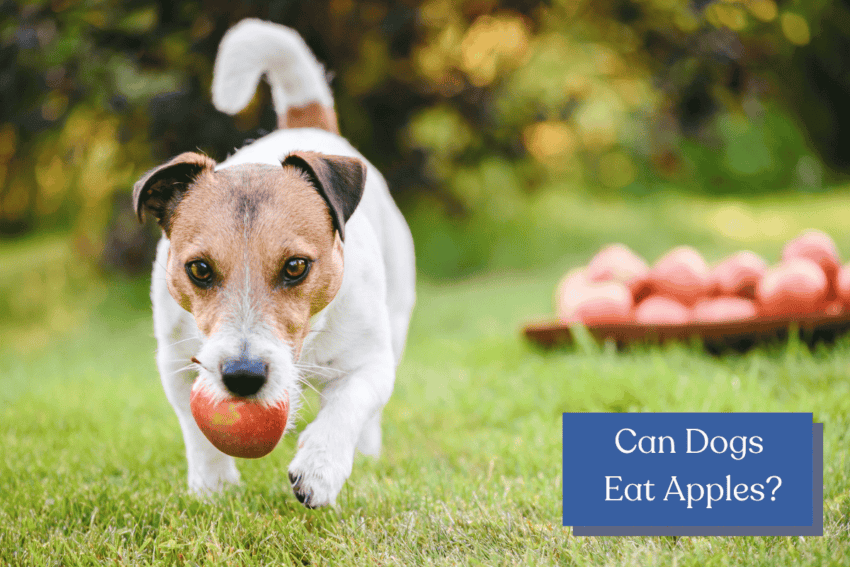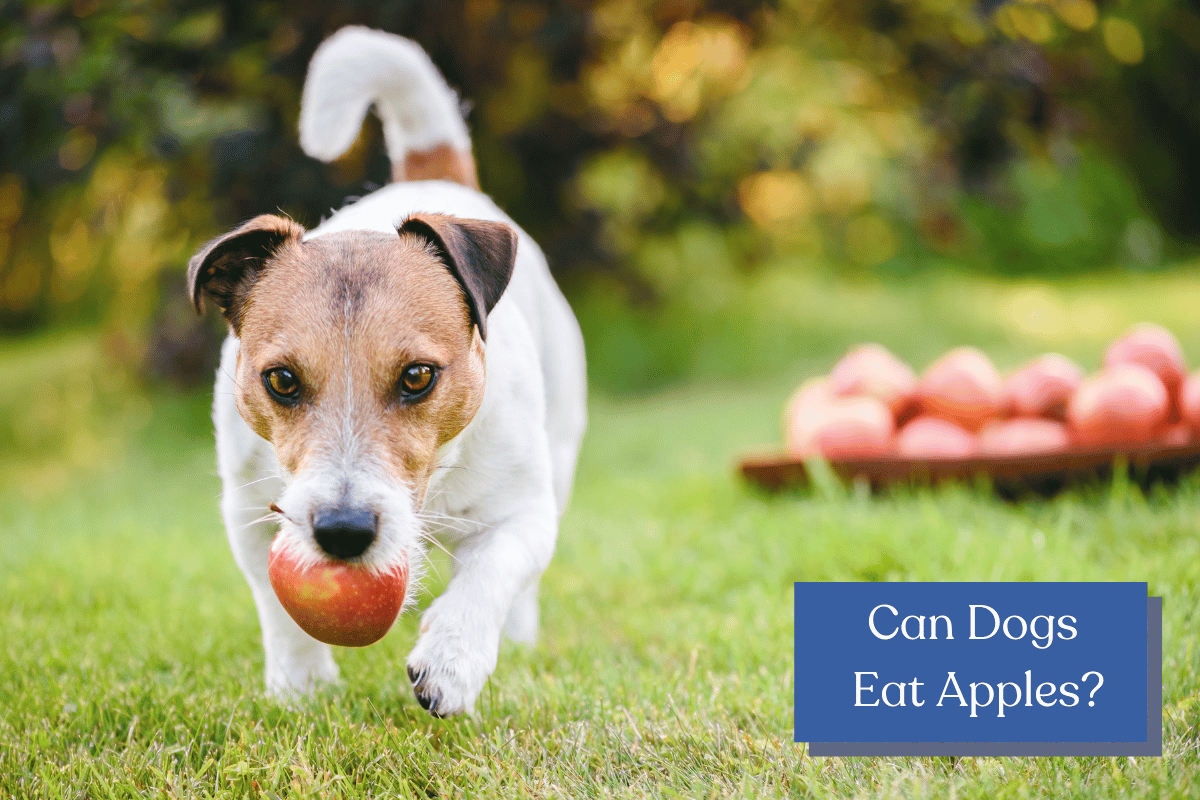Apples are one of the most popular fruits in the world, with almost 27 million of them being eaten by people every day in the US alone! But can dogs eat apples? Let’s take a look at what you need to know!

Can dogs eat apples?
Yes! Dogs can eat apples. In fact, they can be a great addition to your pup’s diet. Packed full of vitamins and minerals, there are many health benefits to giving your dog apples, as well as being a tasty sweet treat.
That said, apples aren’t a meal replacement, but a yummy, healthy extra in addition to a balanced diet. Like any treat, apples should be given to dogs in moderation and prepared for them to eat safely.
It’s also important to know which parts are safe for your dog to eat; the skin and flesh are fine to give to your dog, but the core, stem, and seeds are not.
Can dogs eat red and green apples?
Yes, dogs can eat both red and green apples. Although green apples are actually slightly healthier than red ones because they’re lower in carbohydrates and sugar, and contain a little extra vitamin A!
Can I give my dog an apple core?
No, you shouldn’t give your dog apple cores. If you want to give your dog apples, you should only give them the skin and flesh of the apple, not the core. The cores of apples are serious choking hazards and can even cause internal blockages if swallowed, which are very dangerous.
Are apple seeds toxic to dogs?
The short answer is yes, apple seeds are toxic to dogs – and humans! This is because they contain trace amounts of cyanide, which is a highly toxic chemical. However, the amount of cyanide in apple seeds is very small and would have to be consumed in massive amounts to have a life-threatening effect.
In fact, the average dog would have to eat seeds from around 200 apples to be poisoned by them. That’s a lot of apples!
That said, if a dog has liver disease, small amounts of cyanide can be fatal, so take this into consideration. Even if your dog is healthy, apple seeds still pose a blockage hazard if swallowed. So it’s best to avoid giving your dog apple seeds.
Can puppies eat apples?
Yes, puppies over 12 weeks old can eat little bite-sized slices of apple as the odd treat in addition to a healthy, balanced diet.
Can dogs have apple juice?
A little bit of organic apple juice is fine to give your dog, just so long as it’s not concentrated. Concentrated juice has a lot of added sugar, which is not healthy for dogs! However, a few licks of all-natural juice are fine.
How much apple can I give my dog?
The general rule of thumb is that you can give your dog around 1-3 slices of apple in one go, depending on the size of your dog. For example, a smaller dog, such as a Chihuahua, is best off being given a slice or two, whereas a bigger dog, such as a Labrador, could have two or three.
As with any treat, too much apple can give your dog an upset stomach. So, if your dog experiences a tummy upset after eating some slices of apple, try giving them a smaller portion next time.
How often can a dog eat apples?
Apples are a healthy snack but should be eaten in moderation, so a slice or two every day is fine in place of a regular dog treat, or a couple of times a week in addition to regular dog chews and biscuits.
How to feed your dog apple
As mentioned above, you shouldn’t just give your dog a whole apple. It’s too big a portion and it’s also a choking hazard, as well as a blockage hazard. It’s best to give your dog small slices to avoid safety risks and for better portion control.
There are also more creative and fun ways to give your dog apples. If you ever cook apples for yourself as a warm winter treat, consider giving your dog a couple of spoonfuls in his bowl, as long as there’s no added sugar.
For the summertime, you could even make them a little apple smoothie or some ice cream by mixing some organic apple juice with some yogurt. Alternatively, you could bake them into some homemade doggy biscuits. Delicious!

Benefits of eating apples for dogs
Apples are a great source of vitamin C, vitamin A, and potassium for dogs. They’re also low in sugar, making them an acceptable treat for diabetic pooches. Vitamin C is a powerful, essential antioxidant that fights free radicals in the body, and vitamin A supports healthy vision, bone growth, reproduction, and cellular differentiation, as well as immune health.
Potassium is an important electrolyte that aids in the electrical charges of the heart and assists in nerve health and muscular movement. They’re also chock full of other antioxidants and fiber, especially in the peel, which aids healthy digestion and weight maintenance. The texture of apples also provides a good teeth cleaning and breath freshener!
Risks of eating apples for dogs
As we mentioned above, the two biggest risks of eating apples for dogs are choking and internal blockages, but this is really only a risk if you let them eat the core and/or the seeds. If they do eat the core, they’ll most likely be fine, but you should be aware of the risks.
Choking
Signs of choking in dogs include:
Struggling to breathe
Gagging
Panic
Pawing at the mouth
Drooling
If your dog starts to choke, you should open their mouth without tilting their head back and remove the apple if you can see it. If you can’t, you’ll need to perform the Heimlich maneuver to dislodge it.
Internal blockages
An internal blockage is precisely what it sounds like; when a small, tough, or jagged object gets stuck inside the intestines.
Signs of internal blockages in dogs include:
Vomiting
Diarrhea or inability to poop
Lethargy
Rapid breathing
Appetite loss
Thirst & dehydration
Lip licking
Bloating
Pacing
Intense discomfort & pain
Internal blockages almost always require surgery to remove. Some of these symptoms can also point to other things, but it’s important to get them checked out as soon as possible, because internal blockages are very dangerous, painful, and can be lethal.
Apple seed poisoning
As we mentioned above, a healthy dog will not be poisoned by eating a few apple seeds, but should your dog suffer from liver disease, it could have a lethal effect.
Symptoms include:
Difficulty breathing
Irregular heartbeat
Drooling
Seizures
Coma
You should take your dog to the emergency vet as soon as possible if they exhibit signs of poisoning, or call the Pet Poison Helpline if you’re unsure.
Can dogs be allergic to apples?
Like humans, dogs can be allergic to almost anything – including apples. However, it’s a pretty rare allergy. Signs of food allergies to look out for in dogs include excessive shedding, poor coat quality, smelly coat, low energy, and regular stomach upsets.
If you think your dog could be allergic to something, consider doing a food allergy test with your vet and of course, cut out whatever they are allergic to. Thankfully, apples are pretty specific, so if your dog is allergic to them, it shouldn’t affect their overall diet too much, and there are plenty of alternatives.
Alternatives to apples for dogs
If you can’t or don’t fancy giving your dog apples, consider some of these safe fruity alternatives!
Apricots
Apricots are a yummy alternative to apples and are known to improve digestion and lower blood pressure. Just be sure to remove the pit, stem, and leaves, first.
Bananas
Bananas are another great, low-calorie alternative to apples. They are rich in potassium, vitamin B6, vitamin C, magnesium, and manganese, as well as fiber.
Pumpkin
Pumpkin is a very good treat for dogs and is actually a common ingredient in dog foods because of its awesome digestive health benefits. They’re also a wonderful natural remedy for upset tummies. Just remember to cook it first, or buy a can of plain pumpkin, or some pumpkin puree.
Strawberries
Strawberries are rich in vitamin C, fiber, and anti-oxidants and even contain Omega-3, which is terrific for healthy bones, skin, and coats. Try them with blueberries in our frozen dog treat recipe.

Pineapple
Pineapple is chock full of healthy vitamins and minerals for dogs, including manganese, copper, potassium, magnesium, and iron, as well as calcium, phosphorus, and zinc.
Other alternatives
Other fruits you can give your dog include:
Raspberries
Blackberries
Blueberries
Cantaloupe
Coconut
Cranberries
Honeydew
Kiwis
Mangoes
Oranges
Papayas
Peaches
Pears
Watermelon
Fruits to avoid
Toxic & dangerous fruits to never give your dog include:
Grapes & raisins
Boysenberries
Cherries
Figs
Grapefruit
Lemons
Limes
Plums
Avacado
Is your dog a fan of apples? Let us know in the comments down below!


